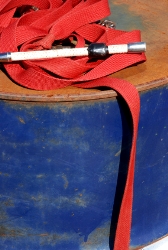Today’s wireless-sensor networks can do everything from supervising factory machinery to tracking environmental pollution to measuring the movement of buildings and bridges.
A team of students from Embry-Riddle Aeronautical University demonstrated a first in aviation history.
The list highlights vulnerable elements where global production is concentrated in a small number of countries, including metals that are critical to development of a low-carbon digital economy. The list helps to focus future research on diversifying supply from new resources, using greener production technologies and cost-effective recycling.
The project is slated to be the first plant in the United States to produce GTL transportation fuels and other products.
Alternative fuel sources for cars may have a glowing future as a Kansas State University (K-State) graduate student is working to replace petroleum fuels with ones made from sunlight.
California beach towns could face hefty economic losses caused by sea level rise in the next century, according to a new state-commissioned study.
The Empire State Building has been awarded LEED® Gold for Existing Buildings certification as further recognition from the $550 million Empire State ReBuilding program.
They expressed concerns ranging from safety, such as unpredictable weather patterns and dangerous ice conditions, to changes in plants and animals as well as decreased availability of firewood.
The state-of-the-art biomass gasification system will provide clean, carbon-neutral heat and power to the medical center.
How can legislation be used to avoid hazardous waste being dumped where it could poison people and the environment in developing countries? Introducing producer responsibility could be one solution, says Panate Manomaivibool of the International Institute for Industrial Environmental Economics (IIIEE) at Lund University, Sweden, in a new thesis.
The new UNTHA Recycling Technology (URT) system at the Appliance Recycling Centers of America (ARCA)’s facility in Philadelphia is ready to begin recycling as many as 150,000 refrigerators annually, GE and ARCA announced Sept. 9.
RadioShack collects 5-million pounds of rechargeable batteries.
Mutual Housing has been known for its green focus since 2003 when the nonprofit became the first multifamily development to install solar electricity in the Sacramento Municipal Utility District.
A recent study from a duo in Kansas State University's department of apparel, textiles and interior design found that when it comes to consumers' rationale for not purchasing sustainable clothing, perception and reality aren't always cut from the same cloth.
A new report offers insight into public opinion about the environment, including the need to conserve and safeguard the health of our ocean.
Clouds only amplify climate change, says a Texas A&M University professor in a study that rebuts recent claims that clouds are actually the root cause of climate change.
Scientists have successfully created synthetic crystals whose structures and properties mimic those of naturally occurring biominerals such as seashells. The findings, published in the journal Nature Materials, could be an important step in the development of high-performance materials, which could be manufactured under environmentally-friendly conditions
Measuring the emission of greenhouse gases from croplands should take into account the crops themselves, according to new research.

When many people think of industrial chemicals, they think of those scary-looking yellow drums, containing unknown but almost certainly hazardous goo. A new industry initiative, though hopes to change that by giving consumers more information on the chemicals they use every day.
In an attempt to mimic the photosynthetic systems found in plants and some bacteria, scientists have taken a step toward developing an artificial light-harvesting system (LHS) that meets one of the crucial requirements for such systems: an approximately 100 percent energy transfer efficiency.